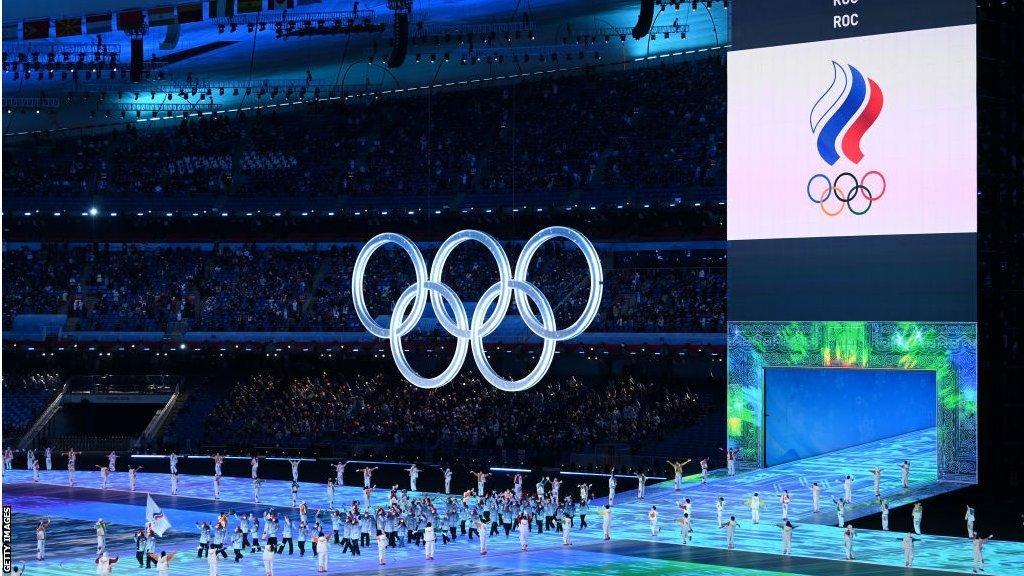Paris 2024: Olympic federations ask IOC to allow Russian & Belarusian athletes to compete as neutrals
- Published

Russian athletes could only compete at the 2022 Winter Olympics - which took place prior to the invasion of Ukraine - as Team ROC because of a ban on Russia over doping violations
Olympic sports federations have asked the International Olympic Committee to allow Russian and Belarusian athletes to compete as neutrals at next summer's Paris Games.
Russia and Belarus were sanctioned but not banned by the IOC after Russia's invasion of Ukraine in February 2022.
In March, it recommended individual athletes compete as neutrals but has not yet made a decision about Paris.
The federations want a decision to "bring clarity" to qualifying events.
They added that athletes had competed as neutrals in those events "largely without incident" and that they had the backing of national Olympic committees.
The Paris Olympics take place from 26 July to 11 August 2024.
IOC president Thomas Bach indicated last week that a final decision on Russian and Belarusian involvement would come at an IOC executive board meeting in March next year.
The request was made in an IOC communique published after the Olympic Summit in Lausanne, Switzerland.
The IOC told the summit that if individual athletes were allowed to compete it would be under the strict conditions of neutrality, meaning their flags, national anthems or any other national symbol must not be used.
It only extends to individual athletes, not teams, and there will be no changes to qualification systems or quota places to accommodate such athletes.
The IOC's executive board has also previously told international federations and event organisers that athletes and support personnel who actively support the war in Ukraine, or who are contracted to the military, should not be permitted to compete.
The National Organising Committees of Russia and Belarus would also play no part in the Games.
The IOC was criticised this year for saying it is "exploring a pathway" for Russian and Belarusians to compete.
The United Kingdom was among more than 30 countries to pledge support for an ongoing ban, with UK culture secretary Lucy Frazer saying the IOC's plans were "not credible".
In July the organisation said it "has found middle ground" for athletes from Ukraine, Russia and Belarus, adding that "it cannot be up to the governments to decide which athletes can take part".
In August, World Athletics president Lord Coe said it is "unlikely" Russian and Belarusian track and field athletes will be to able to compete in Paris.
World Athletics has banned competitors from the two countries from its events, including under a neutral flag, because of the invasion of Ukraine.
In October the Russian Olympic Committee was suspended by the IOC after it recognised regional organisations from four Ukrainian territories illegally annexed by Russia.

The most eaten meat in the world: Dr Chris van Tulleken discovers how we changed chicken and how chicken changed us
The alien-like lives of octopuses: Brian Cox and Robin Ince uncover the amazing intelligence of these unusual creatures
